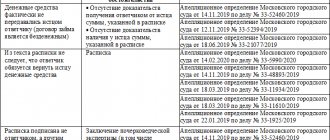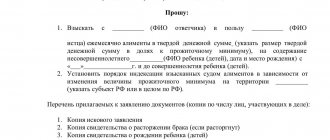Collecting arrears of alimony is not a simple matter. Many people are concerned about how to collect alimony debt.
The court, bailiffs, and a lawyer come to the rescue, whose competence includes extremely important family issues - the collection of alimony for minor children. Our debt collection lawyer will help you achieve alimony in the fight against the debtor.
Procedure for collecting alimony debt
The reasons for the formation of alimony debt in most cases are:
- evasion of payments with intent;
- the debtor's inability to make timely payments;
- accounting error in the process of deduction from monthly earnings;
- the recipient of alimony does not report his location or refuses transfers.
Debt, in this case, is understood as the amount of alimony obligations that should have been paid by agreement, court decision or court order. As a general rule, debt is subject to collection by the SSP service for 3 years preceding the application. After the initiation of proceedings, the SSP official calculates the debt.
If the debtor (or claimant) does not agree with the above calculation, the said decision may be appealed to a higher authority or court. If you disagree with the procedure for calculating the debt, you can appeal the bailiff's decision in the order of subordination (file an administrative complaint), as well as challenge it in court.
So, your actions in case of non-payment of alimony should consist of the following points:
Contacting the bailiff service with an application to determine the amount of debt and its collection. In this case, the service issues a corresponding decision.
If you disagree with the resolution (amount of debt, unaccounted income, etc.) mentioned in the first paragraph, contact the court or a higher authority (in the order of subordination) and appeal the specified non-normative act.
If the debtor belongs to the category of “malicious” defaulters, he may be brought to criminal liability.
Punishment for evasion
For deliberate failure to pay alimony, a man may be brought to civil liability in the form of a penalty. The parties have the right to agree on the amount of the fine and enter into a voluntary agreement on its repayment, however, if it is not possible to reach a consensus, the amount will be calculated automatically according to the scheme “0.5% of the total debt for each day of delay.” If the calculation of alimony was carried out under an amicable notarial agreement, then the penalty should be as much as was agreed upon in the provisions of this document.
In addition, as part of civil liability, a negligent alimony payer may also be required to compensate for losses, but only if this amount is not covered by a penalty. For example, it is legitimate to talk about compensation for losses when the child needed medications that the mother planned to buy with alimony received from the father. However, payments from the man stopped coming, and therefore the woman was not only unable to purchase medicines for the minor, but was also forced to incur additional expenses due to the exacerbation of his illness. When going to court, she will be able to demand both repayment of the debt and payment of a penalty and compensation for unforeseen expenses.
Administrative penalties may also be applied to the debtor. First of all, the bailiff, who is called upon to collect payments in accordance with the writ of execution, is responsible for their imposition. Supervisory functions are assigned to bailiffs by Federal Law No. 229-FZ. Thus, these authorized persons can:
- impose fines on the evader (up to 20,000 rubles);
- seize his bank assets or forcibly withdraw money from them;
- prohibit the debtor from making transactions with the property belonging to him;
- prohibit travel abroad;
- limit the ability to take out loans;
- deprive of the right to drive vehicles.
If it is necessary to compensate the mother for the amount of the resulting debt, bailiffs have the right to pay attention not only to the actual income of the alimony payer, but also to his third-party property. We are talking about deposit boxes, savings in national or foreign currency, housing that can be sold, alienated in favor of the child’s mother, or sold by authorized employees to transfer the proceeds to her. The final order of property recovery (i.e., the order of what will be alienated/sold and for what) is determined by the bailiff himself, and the debtor in this case can only offer this or that value.
If a woman does not remind the alimony payer of the need to repay the debt, this does not mean that he can continue to evade his responsibilities. The mother has the right to initiate measures to collect money at any time, not even limited to the child’s coming of age. The amount can be withheld even after he reaches the age of 18 for another 3 years - this is the statute of limitations for these cases. Automatically, i.e. Without a trial, the father is released from the obligation to pay the debt only in one case - in the event of death. The debt passes to the people who inherit the property of the deceased, and is calculated in proportion to the shares received by each of them.
Finally, a draft dodger and a persistent defaulter of alimony risks facing criminal liability under Art. 157 of the Criminal Code of the Russian Federation. For violation of a court order or amicable notarial alimony agreement and refusal to support a minor/disabled child, the following types of punishment may be imposed:
- correctional or forced labor (up to 1 year);
- detention (up to 1 year);
- arrest (up to 3 months).
In addition, a woman may try to deprive a man of parental rights for disinterest in the child’s life and ignoring the primary needs of a minor.
Claim for collection of arrears of alimony
An application for collection of alimony arrears (in case of disagreement with the amount of arrears) must contain information about what circumstances were not taken into account by the SSP official when making the decision, as well as provide the correct calculation. The application itself is considered by a magistrate, according to territoriality.
If the dispute is not related to the amount of debt, you can go to court in accordance with the administrative procedure provided for by the CAS of the Russian Federation.
The statement of claim must contain the following information:
- The court where the application is filed;
- Full name, address of the plaintiff;
- Full name, address of the defendant;
- Amount of claims;
- Information about the reasons, period of debt formation, previously issued judicial acts, decisions of the BSC, concluded agreements, etc.
- Calculation of what you think is the correct debt;
- In the pleading part - ask to collect the debt;
- Appendix – documents on which you base your requirements (in accordance with Article 132 of the Code of Civil Procedure of the Russian Federation).
The specified application is not subject to state duty, in accordance with subparagraph 2 of paragraph 1 of Art. 333.36 Tax Code of the Russian Federation.
IMPORTANT : the application can be submitted either electronically or on paper.
If you file an administrative application, send it to the district court. The period for filing an appeal is 10 days from the moment you learn that your rights have been violated (if you appeal the actions of the SSP employee). The application form is similar to the application submitted under the Code of Civil Procedure of the Russian Federation.
If the defendant is the SSP, then in the petition part it is necessary to indicate: “I ask that the decision of the SSP No., date be declared illegal, and that the violations be eliminated by recalculating the amount of the debt.
The list of documents attached to the application is provided for in Part 1 of Article 126, Part 3 of Article 220 of the CAS of the Russian Federation. The claim itself is sent to the court at the location of the defendant and can be filed either electronically or on paper.
USEFUL: more tips on filing a claim in court - watch the VIDEO
Review of judicial practice
Example. Citizen B. received a notice stating that his ex-wife N. filed a lawsuit in order to recover alimony for their minor daughter. In her petition, N. stated her desire to apply a shared deduction scheme to the man’s income (we are talking about 25% of the salary). However, B. lost his official place of employment, which was known to his ex-wife. The defendant then filed an objection to notify the judge.
In his objection, B. indicated that he disagreed with the collection of alimony in shared form. He explains this by his unstable financial situation at this time. The plaintiff’s demand is to establish a different deduction scheme, namely to assign alimony in a fixed amount. The court fully satisfied the defendant's demands, since all arguments were taken into account.
Deadline for calculating alimony debt
If the debt arose for the first two reasons, i.e. due to the fault of the payer, the limitation period does not apply. It is possible to submit a statement of claim to the payer for the collection of arrears of alimony for the 3-year period before applying to the courts.
Debt can be calculated in several ways, which are chosen depending on the form of payments and the debtor’s willingness to contact the bailiffs. For example, if the payment of alimony is assigned as a share of the debtor’s monthly income, then information about the amount of salary and sources of income is taken as the basis for the calculation. If they are not presented, the calculation is carried out by bailiffs, taking into account the average wage in the country.
What are the restrictions?
If the debtor could not pay the funds through no fault of his own, then the debt may be limited to a period of 3 years (if it is actually longer). The following reasons are needed:
- The recipient of alimony did not promptly notify the payer of the court decision;
- In the company where the payer works, wages are often delayed for a long time, and he has no other income;
- The alimony debtor has experienced illness;
- It has been proven that the delay in financial receipts was due to the fault of the postal services;
- There were force majeure circumstances.
Peaceful settlement of alimony debt
If, during a divorce, the parents entered into an agreement on voluntary financial participation in the life of the child, then the situation develops in brighter colors. But even here, difficulties may arise with the payment of alimony by one of the former spouses.
In this case, collection occurs on the basis of a drawn up agreement, but with the help of regulatory authorities. Most often, the settlement agreement on providing support to the heir is observed impeccably, because already at the stage of forming the document it was based on voluntary principles.
In the agreement itself, parents indicate the following information:
- the amount of money to be transferred monthly to the child’s account (also find out how to collect child support after 18 by following the link);
- terms of payment of alimony;
- procedure for making monthly payments.
ATTENTION : watch our video on the issue of alimony and subscribe to the YouTube channel
Possible scenarios
Litigation can have several outcomes:
- The court satisfies the plaintiff's claims in whole or in part.
- The defendant may be fully or partially exempt from paying alimony.
- The parties reconcile in court and enter into an agreement.
Satisfaction of claims
In order for the plaintiff’s claims to be satisfied in full, it is necessary to draw up a claim in accordance with the norms of the legislation of the Russian Federation, as well as have a good evidence base. Otherwise, the court may side with the defendant.
Grounds for refusing to pay a debt
According to the current legislation of the Russian Federation, the court can either reduce the amount of the debt or cancel it altogether. However, this requires a basis. Here are some of them:
- The debtor was diagnosed with a serious illness.
- The alimony payer lost his place of employment. Dismissal of one's own free will is not taken into account.
- The financial situation of the alimony payer has worsened.
- The debtor has a new dependent.
If the child is fully or partially supported by the state, then this is a direct basis for reducing the amount of alimony.
Conclusion of a settlement agreement in court
There is the possibility of concluding a settlement agreement in court. However, for this to happen, two important conditions must be met:
- The parties have agreed on everything and have no disagreements.
- The interests of third parties are not violated. The child must receive a sufficient amount of money from his parent, who lives separately.
There are several grounds for concluding a settlement agreement:
- The father has no objections to the amount of alimony and the method of collecting it.
- For the alimony payer, a voluntary enforcement procedure is considered more beneficial than a forced one.
- Within the framework of the concluded agreement, the amount of alimony for voluntary payment is higher when compared with a judicial penalty.
Judicial procedure for collecting alimony debt
If amicable and peaceful agreements in the family are not reached, the procedure, terms and amount of payments are established by the court - the process begins on the issue of collecting arrears of alimony. Take into account:
- financial status of both parents;
- the presence of “burdens” in the form of guardianship of disabled people, the presence of other minor children, the incapacity of one of the spouses and caring for elderly incapacitated persons;
- the lawyer checks the evidence presented by the second party, since the certificates provided about the amount of income may not correspond to reality and reduce the amount of arrears for alimony obligations;
To protect the interests of minors in court, interested parties resort to the help of professional lawyers.
ATTENTION: our lawyer is ready, guided by all legal means, to seek for you the collection of arrears of alimony in court.
Causes
Child support debt can arise for various reasons. Therefore, responsible persons always conduct a thorough analysis to determine the reason why the claimant did not receive the agreed funds - these could be either difficult life circumstances beyond the control of the alimony payer, or his direct intention aimed at saving his own money.
For example , for the loss of a job, deterioration in health, or lack of a fixed and constant income, the second parent will most likely not be subject to strict liability measures. If these and similar reasons are of a long-term nature, but do not contain direct intent and do not contain the actual guilt of the alimony payer, a decision may be made in court to reduce the amount of alimony payments. When the debtor’s life circumstances turn out to be extremely difficult, and the grounds for non-payment of alimony are quite valid, the court completely or partially removes the debt from the person (Article 114 of the RF IC). And yet, he will have to pay alimony in the future, albeit in a more modest amount, one way or another. As soon as the man’s financial situation improves, the woman will have the right to file a claim to revise the amount of payments towards an increase.
A reduction in the amount of alimony is possible only if there is a claim filed in a timely manner by the payer in the magistrate's court. If a man did not submit the appropriate application and simply decided not to accrue payments to the child for 2 months or more, this will most likely be regarded as evasion, even despite the possible presence of justifying circumstances.
However, as statistics show, in most cases, fathers still become conscious draft dodgers, i.e. carry out various dishonest manipulations, after which much smaller amounts are withheld for the maintenance of children. We are talking about deliberate concealment or understatement of real income, re-registration of personal property to other persons, constant movement from place to place without notifying the claimant, etc. If a woman suspects a man of such fraud or even has materials confirming this in her hands, she will be able not only to receive the entire amount of debt for the period of non-payment (Article 113 of the RF IC), but also to bring the debtor to justice within the framework of the law.
Who can claim a penalty
The recipient with whom the alimony agreement was concluded, or who receives funds for maintenance by a court decision, has the right to demand a penalty for alimony.
These are former spouses with children left in their care, or elderly parents. The recipient's right to receive penalties for alimony payments arises the very next day after the first day of delay. Article 115 of the Family Code talks about the payer’s liability for each day of non-payment. ConsultantPlus experts looked at how to achieve alimony:
- for minor children;
- for adult children.
Use these instructions for free.
What is malicious evasion of alimony payments?
Malicious evasion is the systematic neglect by the debtor of his obligations to support a minor child or children. Signs of malicious evasion are:
- the debtor is wanted for non-payment of alimony;
- large amount of debt;
- concealment of real earnings;
- change of place of residence in order to avoid the collection of alimony;
- refusal of employment through the employment service;
- failure to pay child support for four months or more.
Willful non-payers of alimony can be brought to administrative, civil, and sometimes criminal liability. The law provides for various sanctions for such debtors:
- seizure of bank accounts and property for subsequent debt repayment;
- ban on traveling abroad;
- restriction of rights to drive a vehicle;
- collection of penalties, penalties, interest and compensation in excess of the debt amount;
- deprivation of parental rights;
- referral to forced labor;
- imprisonment for up to one year.
Only a court can recognize a debtor as a willful defaulter. He will also determine the punishment for non-payment of alimony.
What needs to be attached to the claim, and how to correctly calculate the penalty
The applicant’s arguments must be supported by references to articles of the Code of Civil Procedure and the Family Code of the Russian Federation, as well as written evidence. The following documents must be sent to the court with the claim:
- a copy of the plaintiff's passport;
- birth certificates of children and divorce (if available),
- a judge’s decision to award payments or an agreement certified by a notary;
- resolutions of the bailiff on the initiation of enforcement proceedings and on the calculation of the amount of debt;
- a printout from a bank account confirming non-transfer of alimony.
If the alimony debt arose due to the fault of the payer, then the plaintiff has the right to demand a legal penalty. It is 0.1% of the amount of alimony for each day of non-payment.
For example, a father was obliged to pay 10,000 rubles per month for his child. The debt arose from February to April 2020. Then the amount of the fine is calculated as follows: for February - (10,000 * 29 * 0.001) = 290 rubles, for March - (10,000 * 2 * 31 * 0.001) = 620 rubles, for April - (10,000 * 3 * 30 * 0.001) = 900 rub. The total amount is 1810 rubles.
The plaintiff can present to the court papers about additional expenses incurred in connection with the second parent’s evasion of responsibilities. For example, a copy of the loan agreement that was concluded to pay for the child’s trip abroad for treatment.
Where should I file a claim?
If, on the basis of one of the enforcement documents listed above, enforcement proceedings were opened, the work of forced collection of payments and debt calculation must be carried out by employees of the bailiff service. It is with the FSSP that you need to begin the procedure for collecting alimony debt. At the request of the recipient of alimony, bailiffs will issue a certificate stating for what period and in what amount the alimony debt has accumulated (Article 113 of the RF IC).
A certificate issued by bailiffs is the main evidence of the existence of alimony debt. It should be attached to the statement of claim, which is submitted to the magistrate's court.
You can file a claim with the court of your choice - at your own place of residence or at the place of residence of the alimony payer. It is preferable that the claim be heard by the same judge who originally made the decision or ordered the payment of alimony.
Rubric “Question/Answer”
To file a debt collection lawsuit, you need a copy of the original judgment or order, but I don't have one. Where should I go to get it? Previously, the court did not provide it.
Expert opinion
Semyon Frolov
Lawyer. 7 years of experience. Specialization: family, inheritance, housing law.
The answer to the question depends on whether you went to court to collect alimony? If there was an application for a court order, the father could cancel it within 10 days. Then you will have to act not in a simplified manner, but to file a claim for the recovery of alimony. After this, the court makes a decision. Next, it comes into force. Currently, courts do not issue writs of execution. You need to apply for them yourself, for example, to the court office (every institution has one). The application period is within 10 days after the court decision enters into legal force. Perhaps the IL got lost. Then all that remains is to obtain a duplicate of it - and to do this, apply to the court with an application to issue a duplicate of the writ of execution. Usually no questions arise (see “Collection of alimony under a writ of execution”).
The question is the following: I have an agreement with my ex-husband on the payment of alimony in 2021. As of May 2021, no child support payments will be made. What should I do first: write a statement of claim to the court or contact the FSSP?
Expert opinion
Semyon Frolov
Lawyer. 7 years of experience. Specialization: family, inheritance, housing law.
First of all, you need to establish the exact amount of debt. To do this, contact the SSP department at the place of residence of your ex-husband. The application is called “...on the calculation of alimony arrears.” Provided that enforcement proceedings were previously initiated. Attach your passport, child's certificate and a copy of the agreement. The bailiffs are obliged to accept it. Next, the bailiff will calculate the amount of debt along with all fines (penalty). Having this certificate in hand, you can file a claim in court for forced collection of alimony payments. You can calculate the debt without bailiffs. But this is more complicated, because there are many formulas, clarifications, and nuances. Contact our lawyers - they will tell you how to correctly determine alimony debt.
Do I need to pay a state fee for filing a claim for collection of arrears of alimony?
Expert opinion
Semyon Frolov
Lawyer. 7 years of experience. Specialization: family, inheritance, housing law.
The plaintiff does not need to pay a state fee. We are talking about protecting the interests of minor children, because they do not receive child support due to the fault of the defaulter. Therefore, the courts exempt plaintiffs from paying state fees. The amount is recovered from the defendant. It is he who will have to pay 300 rubles - this is exactly the state fee for filing a non-property claim.
Who files a claim for collection of arrears of alimony if the child is already 18 years old (mother or child)? And what should we do if production is closed?
Expert opinion
Dmitry Nosikov
Lawyer. Specialization: family and housing law.
Collection of arrears of alimony does not have a statute of limitations. Even if the child is already 18 years old, and the father has a debt, you can go to court.
How does this happen? As soon as the child turns 18, the bailiffs stop enforcement proceedings. A resolution is issued on behalf of the senior bailiff. The alimony case is sent to the SSP archive. If the debt is not repaid, you must first talk to the bailiffs. Indicate that the debtor has an unpaid amount and that termination of the IP is a violation of the rights of the alimony recipient. Next, if there is no reaction, you need to request the bailiff’s decision, and then appeal it to your superiors. The requirement to “ resume enforcement proceedings due to the presence of outstanding alimony debt . If it doesn’t help, go to court with a statement about the unlawful actions of the bailiff. In fact, there is no claim for collection of alimony debt. We are talking about filing an application to reopen closed enforcement proceedings. If everything is done correctly, the bailiffs will take care of the debtor again. It is advisable not to let the matter take its course, but to demand active action: arrest of accounts, inventory of property - in extreme cases, write a statement to bring the evader to criminal liability.
Who can file a claim? An explanation on this issue can be found in the Ruling of the Supreme Court of the Russian Federation No. 58-KG17-19 dated March 2, 2018. The court explains that the corresponding request must be submitted by the mother of a child who has reached the age of 18. At its core, the debt now acts as compensation payments to the parent who himself supported the child until adulthood. Therefore, it is better for the mother to be the plaintiff rather than the child.
Filing a lawsuit is a last resort and effective measure.
However, in order for the statement of claim to be accepted for consideration, and for the court to side with the plaintiff, you need to have a competent position. Any mistake can lead to delays in the matter. It is possible that the defendant will file an objection to the claim or challenge the collection of the debt. Very often, fathers hide from bailiffs, live without registration, hide property, and leave the country. It is necessary not only to point out these facts, but also to substantiate them competently. You will also have to calculate the debt along with the penalty. If you have questions about filing a claim, the package of documents, state fees and deadlines, please contact the lawyers of our website. We help people in difficult life situations. Where you need to take legal actions, take into account the nuances, meet deadlines. The lawyer will prepare a legal opinion, point out errors, give recommendations - and in some cases act as a representative in court. Contact us! Attention!
- Due to frequent changes in legislation, information sometimes becomes outdated faster than we can update it on the website.
- All cases are very individual and depend on many factors. Basic information does not guarantee a solution to your specific problems.
That's why FREE expert consultants work for you around the clock!
- via the form (below), or via online chat
- Call the hotline:
- Moscow and the Region
- St. Petersburg and region
- FREE for a lawyer!
By submitting data you agree to the Consent to PD Processing, PD Processing Policy and User Agreement.
Anonymously
Information about you will not be disclosed
Fast
Fill out the form and a lawyer will contact you within 5 minutes
Tell your friends
Rate ( 6 ratings, average: 4.33 out of 5)
Author of the article
Irina Garmash
Family law consultant.
Author's rating
Articles written
612







